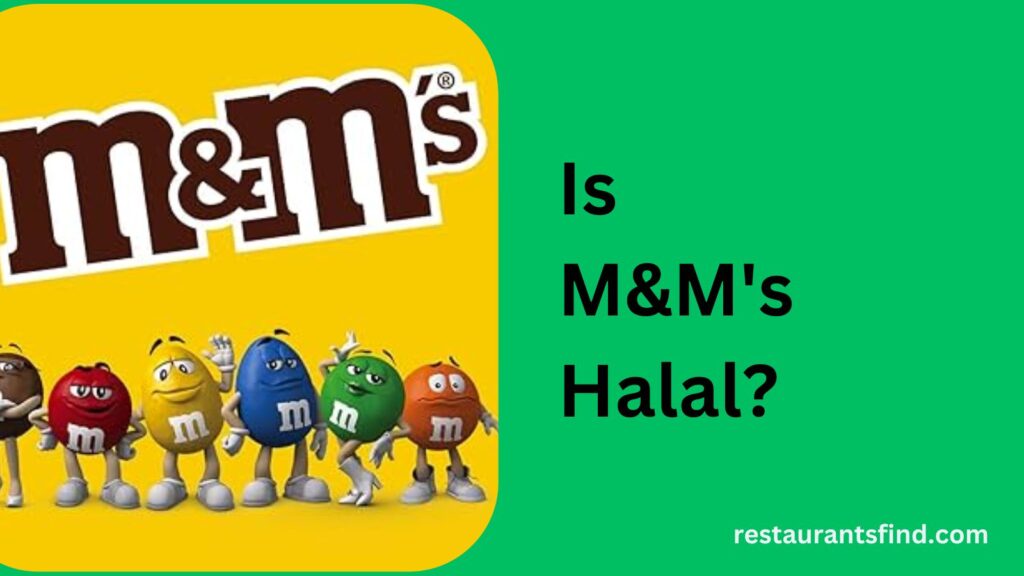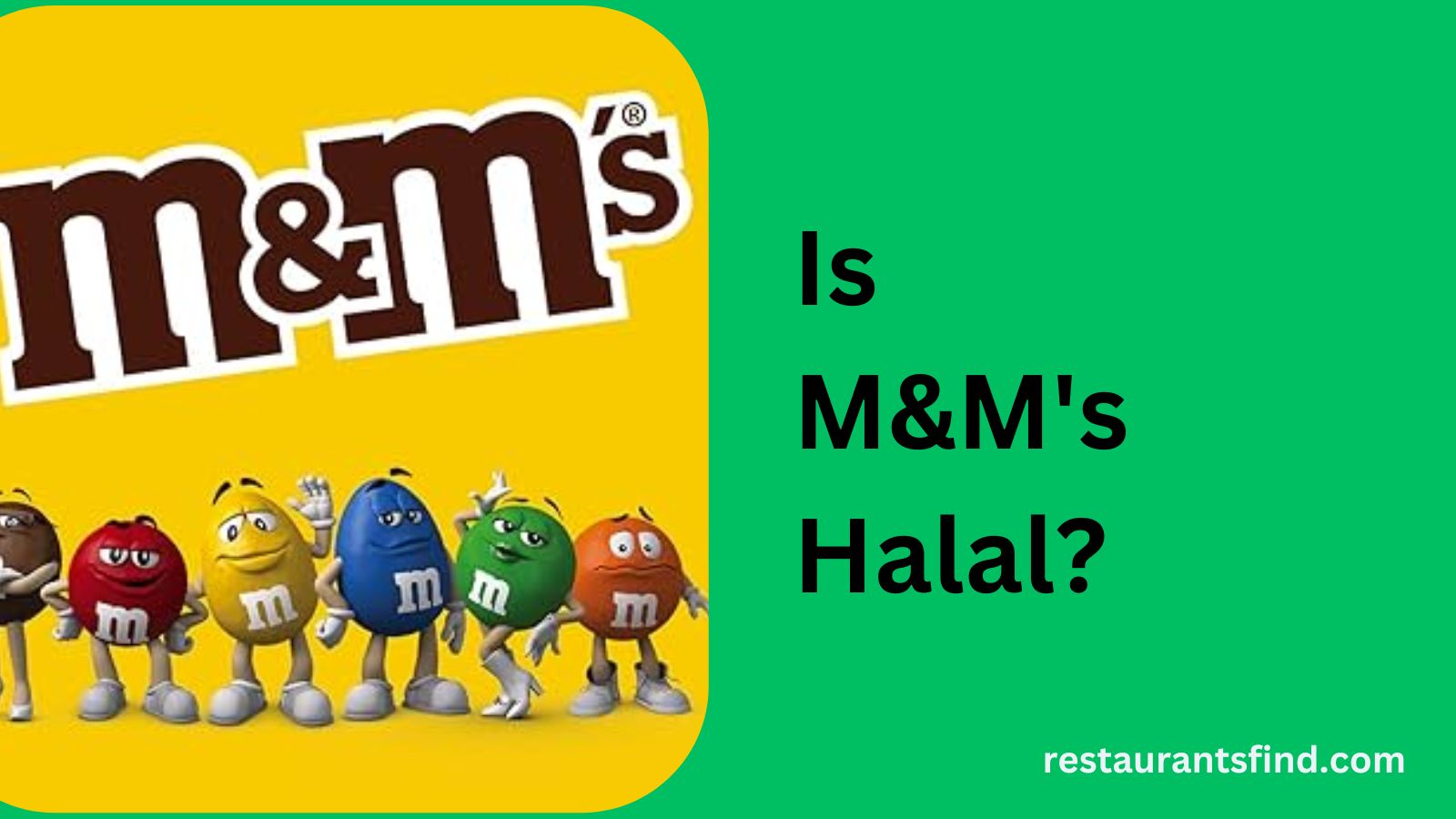M&M’s are a beloved candy around the world, known for their colorful shells and melt-in-your-mouth chocolate. Whether enjoyed as a quick snack or used as a topping for desserts, M&M’s have become a staple in many households. However, for Muslims who adhere to halal dietary guidelines, a crucial question arises: are M&M’s halal?
The concept of halal, which means “permissible” in Arabic, is a fundamental part of Islamic dietary laws. Foods that are considered halal must meet specific criteria, particularly concerning the ingredients used and the process of preparation. In this blog, we’ll explore whether M&M’s meet these criteria and whether they’re suitable for those following a halal diet.

Is M&M’s Halal?
To determine whether M&M’s are halal, we need to examine three key factors: ingredients, official statements, and customer feedback.
Ingredients in M&M’s
M&M’s are primarily made of milk chocolate, sugar, corn syrup, and various coloring agents. While these ingredients may seem harmless at first glance, the concern lies in the specifics. For example, some types of M&M’s may contain carmine, a red coloring derived from insects, or gelatin, which is often made from pork or non-halal sources. Additionally, flavorings and emulsifiers used in M&M’s could potentially be derived from non-halal sources, including alcohol.
The ingredients can also vary depending on the country where M&M’s are manufactured and sold. This variation further complicates the question of whether M&M’s are universally halal or not.
Halal Certification of M&M’s
Halal certification is a process where an accredited body reviews the ingredients, processing methods, and facilities used in the production of a food item to ensure that it complies with Islamic dietary laws. For M&M’s, the presence or absence of a halal certification can make a significant difference for Muslim consumers.
In some countries, M&M’s are certified halal by recognized authorities. For instance, in Muslim-majority countries like Indonesia or Malaysia, M&M’s sold there are often halal-certified. However, in countries like the USA or the UK, M&M’s may not carry a halal certification, leading to uncertainty among consumers.
Official Statements
Mars, Inc. has provided statements regarding the halal status of M&M’s in various communications. On their website, they mention, “M&M’S are not certified as Halal or Kosher. However, they do not contain any pork-based ingredients.” This suggests that while M&M’s may not contain pork, they are not officially recognized as halal due to the potential inclusion of other non-halal ingredients.
Moreover, in a tweet from the official M&M’s UK Twitter account, it was explicitly stated, “M&M’s are not suitable for a Halal diet. We use additives that come from animal products when we’re making M&M’s, and traces of these can be found in the sweets.” This confirms that M&M’s may contain traces of animal-derived ingredients, making them unsuitable for a strict halal diet.
Based on the ingredients, official statements, and customer feedback, it is clear that M&M’s are not considered halal. The absence of halal certification, combined with the presence of animal-derived ingredients, particularly in the red M&M’s, makes them unsuitable for those following a strict halal diet. Muslims who adhere to halal dietary guidelines should exercise caution and consider alternative products that are explicitly halal-certified.
Controversies and Concerns
Over the years, there have been controversies regarding the halal status of M&M’s. Some consumers have raised concerns about the use of specific ingredients like carmine or gelatin. Others have questioned the sourcing of these ingredients, whether they’re derived from halal or haram sources.
Mars, Inc., the manufacturer of M&M’s, has made statements to clarify the ingredients used in different regions, but the absence of universal halal certification leaves room for doubt. Additionally, Islamic scholars have varying opinions on certain ingredients, further complicating the matter for those seeking a clear answer.
Regional Differences
One of the key factors that affect the halal status of M&M’s is the region in which they are sold. In Muslim-majority countries, the demand for halal products is higher, and companies often ensure that their products meet halal standards. As a result, M&M’s sold in these regions are more likely to be halal-certified.
On the other hand, in regions where Muslims are a minority, such as in Europe or North America, the same strict halal standards may not be applied. This regional difference means that the halal status of M&M’s can vary significantly depending on where you are.
Alternative Halal Chocolate Options
For those who are concerned about the halal status of M&M’s, there are plenty of alternative halal-certified chocolates available on the market. Brands like Cadbury, Ferrero, and Lindt offer chocolates that are certified halal in many countries, providing a safe option for Muslim consumers.
These alternatives come in a variety of flavors and styles, making it easy to find something that suits your taste while adhering to halal guidelines. Some of these alternatives even offer similar products to M&M’s, such as chocolate-coated candies with different flavors and textures.
Conclusion
So, are M&M’s halal? The answer depends on where you are and which ingredients are used in the production of the M&M’s you buy. In some regions, M&M’s are indeed halal-certified, while in others, they may contain ingredients that are questionable from a halal perspective.
For Muslims seeking to maintain a halal diet, it’s essential to check the packaging for halal certification and to be aware of the ingredients listed. If in doubt, there are always alternative halal-certified chocolates available that offer the same delicious experience without compromising on dietary restrictions.
Ultimately, the best approach is to stay informed and make choices that align with your values and dietary needs.

